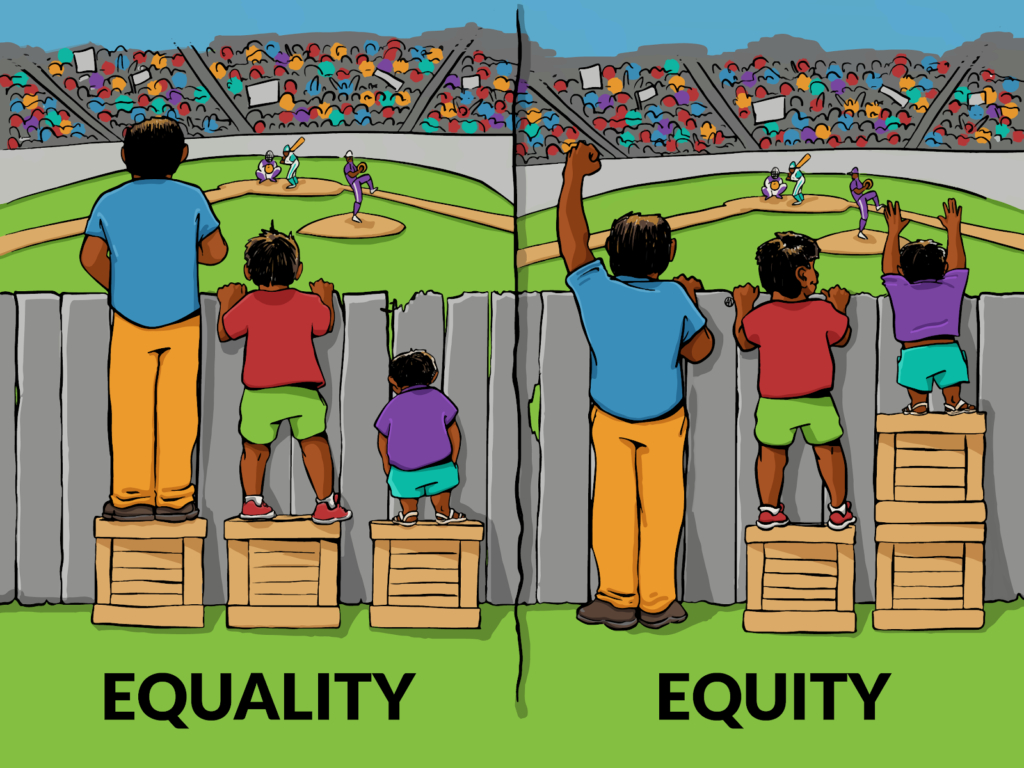10-10-22
A good question arose in our Cuppa the Bible (AoF) discussion this morning and it really has me thinking: Can you have justice without equity?
Of course the first thing to do is to look at what “equity” means if we’re not talking about finance and investments. In essence, according to the National Association of Colleges and Employers, “The term “equity” refers to fairness and justice and is distinguished from equality: Whereas equality means providing the same to all, equity means recognizing that we do not all start from the same place and must acknowledge and make adjustments to imbalances.”
It might be easier to understand with this visual that I frequently use in workshops that I lead.

Equality is giving the same thing to each person (or group) but equity takes into consideration where each person or group is starting from. And the results are pretty obvious. The same size box was given equally to everyone, but that just means that the tallest person is STILL that much taller, and the box size is STILL not enough for the smallest person to see over the barrier.
Equity, on the other hand, recognizes that for all three people to have access to the same view, one person doesn’t need any help and the other two need varying degrees of assistance. Right?
I think the issue of justice begins with defining the problem.
As I look at it, it’s a problem of accessibility to view the game. There is a barrier present preventing two out of three people from seeing it.
Applying a solution “equally” still leaves one of the three people unable to access the game; the barrier is still present for 1/3 of the people involved.
An equitable solution, on the other hands, provides for everyone to have access; it evens the playing field.
But it was important to identify the problem. If we were defining the problem as not related to everyone accessing a view of the game but maybe as … oh, I don’t know … maybe as having something comfortable to stand on (assuming the boxes were padded and provided a degree of comfort), then the first solution would solve the problem, wouldn’t it?
However, if the problem is having the ability to see the game and not be held back by the barrier in front of them, then everyone standing on the same-sized box wouldn’t help at all. (Well … it helps for 1/3 of the people.)
So after we define the problem, we have to really answer the question … How many people do we want to help? If we are happy and content with only helping 1/3 or 2/3 of the group, then go for it. Have an equal solution. But if our faith calls us to be helping everyone we can … to be seeing everyone as a child of God and therefore entitled to accessibility without barriers … then we have to be searching for an equitable solution.
And that brings me back to my original question:
Can you have justice without equity?
I don’t think so.
There are different types of justice: distributive (determining who gets what), procedural (determining how fairly people are treated), retributive (based on punishment for wrong-doing) and restorative (which tries to restore relationships to “rightness”). Now, I admit to being most interested in the last form – restorative justice – because I feel like that’s how we create a better world … closer to the Kin-dom of God. But the other types of justice are important, as well, and as men and women of faith, we are have to recognize that while everyone is “created equal,” we are NOT all born into equal circumstances. Some of us have more privilege or money or health through no fault or efforts of our own.
Yet because we are all children of God and equally beloved of our Creator, we MUST work for the equitable distribution of those privileges — equitable distribution of wealth and month … of power and prestige … equitable access to education and health care … equity in hiring and advancement — and all of that means that some of us need different sized boxes to stand on. People need different amounts (and kinds) of assistance in order to be able to move beyond the barriers that confront them.
And for those of us who have more, we may need to share in order to “even things out a little” (If I’m the tall guy in the picture, I might have to forgo having a box to stand on, for instance.)
So I have to ask myself: Am I willing to do that?
Are you?
Does your faith lead you to want to do that?
Can there ever be any real justice if we don’t do that?
What would Jesus do?
Blessings on your journey!
Pastor Deb
